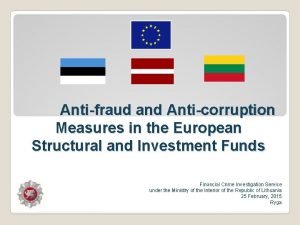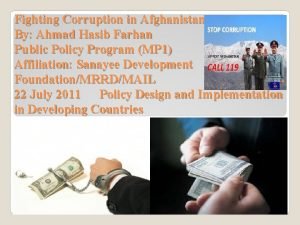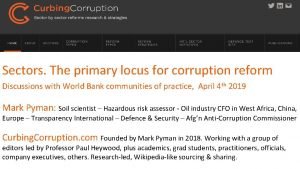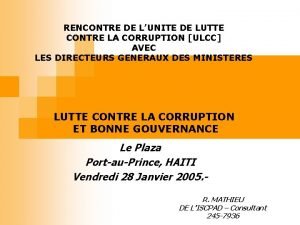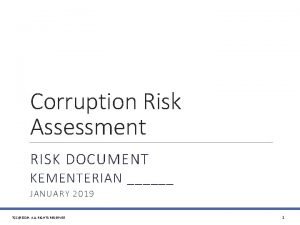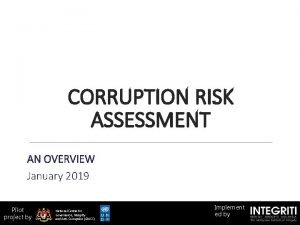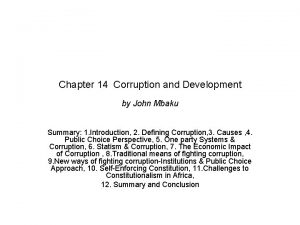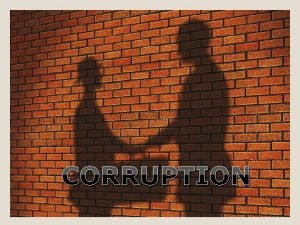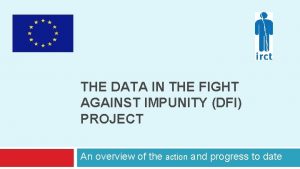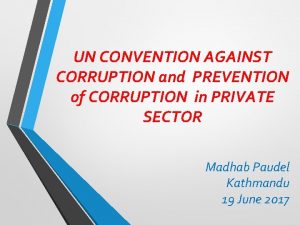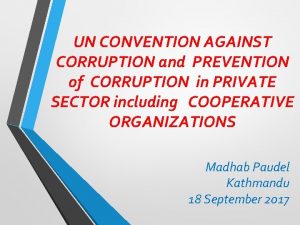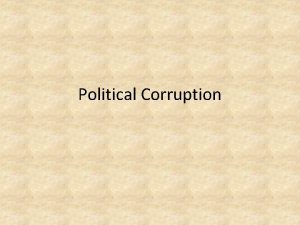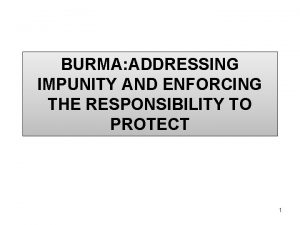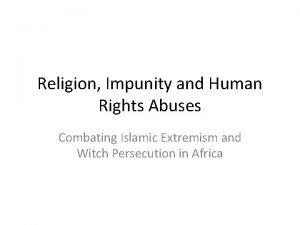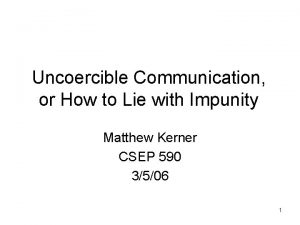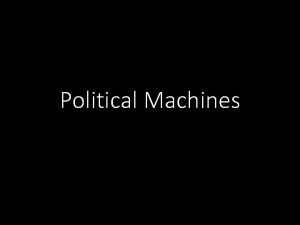Joining Efforts Against Impunity and Political Corruption Monitoring














- Slides: 14

Joining Efforts Against Impunity and Political Corruption: Monitoring and Tackling Corruption and State Capture Ruslan Stefanov Director, Economic Program December 4, 2018 Chisinau Co-funded by the European Union and the Central European Initiative (CEI). The views expressed during this event do not necessarily reflect the views of the European Commission and the CEI.

Contents • Corruption Monitoring System • Corruption and Anti-corruption Dynamics 2014 – 2016: Main Findings • Understanding anti-corruption efforts in SEE: State Capture Considerations • Recommendations

Structure of the Corruption Monitoring System Experience based corruption indexes Corruption pressure Involvement in corruption Attitude based corruption indexes Assessments of the corruption environment indexes Awareness Likelihood of corruption pressure Acceptance Corruptness of officials (identification of corruption) (tolerance) of corruption) Susceptibility to corruption Feasibility of policy responses to corruption

Regional anti-corruption report

Corruption pressure and involvement in corruption (2016) % of the population 18+ who have been asked to give and have given a bribe (money favour, gift) in the last year Albania 40 30 29 Macedonia Bosnia and Herzegovina 28 33 24 Bulgaria 22 Kosovo Montenegro 20 22 22 27 23 Serbia Turkey 50 19 9 11 12 9 Pressure (have been asked for a bribe) Croatia Involvement (have given a bribe) Source: SELDI/CSD Corruption Monitoring System, 2016

Resilience to corruption pressure (among those pressured into bribing) Montenegro 75% 19% Albania 77% 21% Macedonia 75% 21% Bulgaria 74% 21% Kosovo Serbia 69% 25% 71% 27% 66% Bosnia and. . . 28% 56% Croatia 42% 53% Turkey 0% 20% Bribed because pressured 45% 40% No answer 60% 80% 100% Did not bribe, despite pressure Source: SELDI/CSD Corruption Monitoring System, 2016, base: respondents who experienced corruption pressure

Corruption pressure, % (2014 and 2016) 2014 2016 Difference 11 50 10. 0 45 4 15. 0 5 4 39 34 24 22 33 30 30 23 26 5. 0 2 27 23 23 -7 0. 0 -3 13 -12 11 -5. 0 10 12 -15. 0 -15 Albania Bulgaria Montenegro -10. 0 Serbia Macedonia Source: SELDI Corruption Monitoring System, 2016 Kosovo Bosnia and Herzegovina Turkey Croatia -20. 0

Corruption Pressure Bulgaria 1999 - 2016 45% % of the population 18+, who have extended an informal payment or have been asked to make an informal payment (money, gift, favour) 39% 40% 35% 34% 31% 30% 25% 20% 15% 28% 23% 25% 23% 22% 24% 21% 20% 21% 18% 12% 19% 14% 10% 5% 0% 1999 2000 2001 2002 2003 2004 2005 2006 2007 2008 2009 2010 2011 2012 2013 2014 2015 2016 Corruption pressure

Corruption Pressure 2001, 2002, 2014, 2016 70% 60% 50% 44% 40% 30% 28% 2014 2016 20% 10% 0% 2001 2002 Albania Macedonia Croatia Serbia Montenegro Regional (7 countries)

Corruption trends 2001 - 2016 • Some improvement for the SEE region as a whole between 2001/2002 and 2014/2016 • Individual countries seldom show stable improvement over time. • Decline in corruption pressure is typically followed by another increase with average levels of pressure remaining very high over a period of several years. • What are the reasons for this pattern? • State Capture?

Feasibility of policy responses to corruption (%) (% of the population 18+) Turkey Montenegro Bosnia and Herzegovina Croatia 54% 37% 42% 8% 52% 50% 6% 45% 55% 4% 44% 1% Serbia 62% 38% Kosovo 63% 35% 2% Macedonia 63% 35% 2% Bulgaria Albania 67% 76% 30% 22% 0% 20% 40% 60% 80% Corruption can not be substentially reduced Corruption can be substentially reduced or eradicated Don't know/No asnwer Source: SELDI Corruption Monitoring System, 2016 0% 3% 2% 100%

Rethinking corruption measurement and understanding why anticorruption policies don’t work • Corruption decline is very slow in SEE and the reason is not the lack of anti-corruption legislation. • Assessing, monitoring of AC policies and policy tools is important in order to understand corruption dynamics. • Deep understanding of national-level AC policies requires studying and monitoring how these policies are implemented at the level of particular public organizations. • We cannot really understand corruption without understanding the failure of anti-corruption in SEE.

Key recommendations Deliver effective prosecution of high-level corruption • Sentencing of corrupt politicians from the top political echelon provides a strong example for everyone and have proven very effective in strengthening anticorruption measures in Croatia and Slovenia. Adopt an independent corruption and anticorruption monitoring mechanism • The mechanism should be implemented through national and/or regional civil society network(s), and should be independent of direct national government funding. It should serve as a vehicle for opening up administrative data collection and public access to information. Anti-corruption efforts should be focused on critical sectors • Energy, public procurement, corporate governance of state owned enterprises, large-scale investment projects.

Thank you ! Ruslan. Stefanov@CSD. BG
 Anti-corruption efforts
Anti-corruption efforts Elishagoodman.org
Elishagoodman.org Fraud and corruption analaytics
Fraud and corruption analaytics Uk bribery act training slides
Uk bribery act training slides Conclusion on corruption
Conclusion on corruption Causes of scarcity
Causes of scarcity Why did portia kill herself
Why did portia kill herself Locus of corruption
Locus of corruption Conclusion sur la corruption
Conclusion sur la corruption Corruption risk assessment
Corruption risk assessment Corruption risk assessment
Corruption risk assessment Conclusion of corruption
Conclusion of corruption Foreshadowing in the great gatsby chapter 4
Foreshadowing in the great gatsby chapter 4 What do we learn about jordan baker in chapter 3
What do we learn about jordan baker in chapter 3 Corruption causes
Corruption causes
